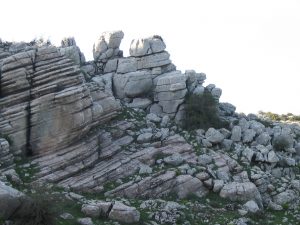“This cannot be correct; God has the thermostat of the earth” said my 80 years old grandmother, in her last attempt to challenge the scientific consensus that the earth’s climate system is warming. As youthful scientists with scientific mindsets, you probably find her argument ridiculous. However, her argument is not entirely false. The earth has a thermostat, the Weathering Thermostat.
A group of scientists in University College London found the first evidence for the planetary thermostat that controls the temperature of the earth. The lead author, Pogge Von Strandmann, describes this process as a mechanism that prevents the temperature of the earth from going crazy.
The process by-which the earth stabilizes its temperature is simple, and have been known for many years; it is called “Weathering”. In this process, rainwater dissolves CO2 from the atmosphere, and combines it with rocks to form bicarbonates. Later, the bicarbonates drift to the ocean, where they react with calcium to be trapped in the form of limestone. Therefore, this process reduces the concentration of CO2, and the climate system cools down. However, if this reaction is slowed down, the CO2 builds up in the atmosphere, traps the heat that is coming from the sun, and the climate system warms up.

Limestone formations in the Torcal de Antequera. Photographer: Juan Fernández Source: http://www.flickr.com/photos/juanjaen/125055912/in/set-72057594101691764/
Still how does the weathering process control the temperature of the earth?
The weathering reaction is temperature dependent; the rate of the reaction increases as the temperature increases, using more CO2 from the atmosphere. But, at low temperatures, the reaction slows down to let the CO2 trap the heat coming from the sun.
If you already know this, you are probably yawning while thinking what is new?
This process had been hypothesized without real evidence. But according to the new study that was published in June 2017, in the journal Geochemical Perspectives Letters, authors have used Li isotopes to monitor the weathering process during the end of the glacial period. Their findings show a decline in the weathering of silicate rocks during the period when the climate system warmed and the ice age ended.
The team chose the Li isotopes because it is solely related to the weathering of silicate rocks. This enhances the certainty that the lowered concentration of Li isotopes in ocean limestone indicates the decline of the weathering of silicate rocks.
In conclusion, the earth had survived sever climate changes. However, fuel combustion, deforestation, and excessive use of pesticides introduce new challenges to the earth. In my opinion, as temperature rises, new natural reactions will be kinetically and thermodynamically afforded, and will reduce the concentration of CO2 in the atmosphere, exactly as weathering does. On the other hand, in her BBC article, Vivien Cumming argues that by the end of this century temperature will rise 4 celsius degrees, a number that she considers to be insane. As a young scientist and an inhabitant of the earth, your opinion on this subject is very valuable…do you have one yet?
By: Maged Hassan
